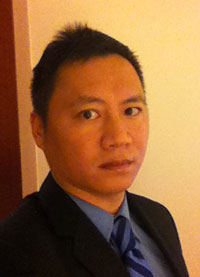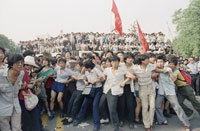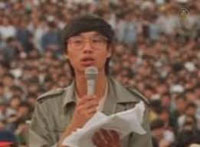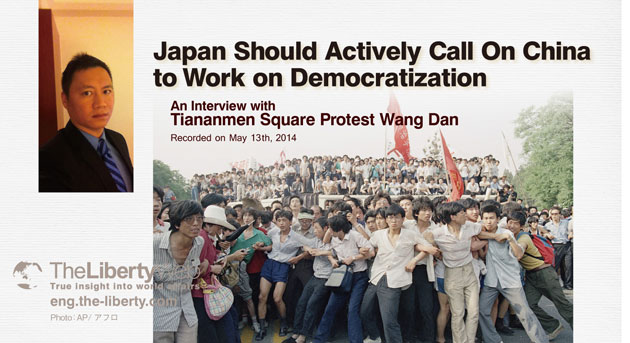An Interview with Tiananmen Square Protest Wang Dan: Japan Should Actively Call On China to Work on Democratization

Wang Dan
(a student leader of the Tiananmen Square protests)
Wang Dan was born in 1969 in Beijing. He is a historian and a leader of the Chinese democracy movement. He is currently teaching history at National Tsing Hua University in Taiwan as a visiting assistant professor.
In the Tiananmen Square protests of 1989, he organized the protests as a student leader. After the incident, he was arrested and imprisoned, but when he was released on parole, he began to live in exile in the U.S. In 2008, he received his PhD in history from Harvard University. Now he lives in Taiwan and is urging China to carry out political reforms.

Tiananmen Square on June 3rd of 1989
Students in the pro-democracy protests crossing their arms to protect from being arrested by the army and the police
The next day, the People’s Liberation Army began a full-scale military crackdown on the protesters.

Mr. Wang Dan delivering a speech in the protests (provided by Wang Dang himself)
Interviewer: Hanako Cho
Q: May I begin by asking you about the Tiananmen Square incident? On June 4th, it’ll be 25 years since it happened, and the Japanese people, especially the younger generation, don’t really know what happened. Also, the older generation doesn’t exactly know because there haven’t been any official reports from the Chinese government or trustworthy releases of information. Could you please describe to me what really occurred, and how severe the suppression was? By your estimate, how many people were killed?
I Wanted Democracy for China in 1989 Because the Government Was Acting Corruptly
A: In 1989, students marched to Tiananmen Square to ask for democracy and liberty because they thought the situation with corruption was serious and would be an obstacle for China. On June 4th the government’s military troops shot at the students. Two thousand students and Chinese people died, and many more were hurt in that moment.
Q: Were they mostly students?
A: Most of them were normal Chinese people.
Q: What kind of role did you play at the time? You were a leader, right?
Before the Tiananmen Square Incident, I Had Participated in Other Movements
A: I was one of the students leaders because I started to participate in democracy movements even before the 1989 incident. The students in the movement naturally elected me to be a leader because I had experience.
Afterwards, I was arrested and put in prison. It was okay for me in prison, I mean my treatment was okay. Many people knew my name and the international community placed a lot of attention on my situation, which was the reason the Chinese government treated me okay. I had many other friends who were put in jail, and they were treated very badly. My situation was a very special case.
Q: How did you gather so many people together in Tiananmen Square at the time?
Leaders of the Student Movement Held Conferences To Plan the Events
A: As a leader, I lead the students to march on Tiananmen Square.
I held conferences beforehand to discuss how to lead the whole movement, and I also initiated a hunger strike. I asked other students to follow me. That was my role.
Q: How do you feel about the current situation in China, because very recently – I think it was in January – even a moderate activist like Xu Zhiyong was arrested. He was caught while spreading a flyer on the street, and the court said it constituted a disturbance of the public order. Is the Chinese government becoming more sensitive about political activities? Are they stepping up their hold on the people? What do you think?
The Current Political Environment Is Even Worse Than It Was in 1989
A: In China, nowadays people can see status of the economy, which is a sign of development, but the government retains very strict control over the freedom of speech and religion. Just four days ago, several government lawyers got together to discuss the June 4th incident.
It’s a very bad situation now. I want the Japanese people to know the political situation is even worse than it was in 1989.
Q: Is it becoming more difficult for activists like you to be able to get together and discuss political issues?
Peking University Students Don’t Have the Right to Freedom of Speech
A: Yes. When I was at Peking University, 26 years ago, I could still hold conferences to talk about political reforms, but now, after 26 years, students at Peking University can’t publically discuss political reforms. I think that’s why the political situation is even worse than it was 20 years ago.
Q: Is Xi Jinping responsible for these restrictions? What’s your opinion of the President of China?
Xi Jinping Is a Conservative Spokesperson
A: I don’t put any hope on Xi Jinping, because he’s preaching for the conservatives in political areas. I haven’t seen any signals from him that he’s wanted to make political reforms, which is why I haven’t had any hope.
In the future, under his control, there may be more restrictions placed on the freedoms of the people. I also don’t think he’s going to do anything about the June 4th incident of 1989.
Q: How do you think China will exert its influence on countries like Taiwan, Hong Kong, and Japan in the future? What kind of pressure will Xi Jinping place on those countries?
The Chinese Communist Party Will Explore New Avenues to Control Its Neighbors
A: China will put more pressure on them in new ways. I mean in the 1980s and 90s, the Chinese government sometimes threatened Taiwan and even Hong Kong with the use of military force. However, on the Taiwan issue, it will use other methods now.
China Wants to Buy Influence in Taiwan
A: The Chinese government will use other various means. It’ll use money to try to buy Taiwan. It’ll establish more connections with Taiwan’s businessmen or even with the government to get a closer relationship, but those connections won’t be with the Taiwanese people. It might also try to get closer to the Taiwanese banks.
Q: What kind of pressure is China exerting on Hong Kong?
Hong Kong Will Lose Its Freedoms
A: Hong Kong is a different story. The Chinese government will put greater restrictions on the freedom of Hong Kong. It’ll surprise the city. It will crackdown on some of the protests of Hong Kong people. It’ll use force.
Q: I heard that the people in Hong Kong had planned to have protests on June 4th, but they were postponed or prevented?
Hong Kong Is Part of China
A: Well, I cannot go to Hong Kong because Hong Kong is a part of China. I was refused to enter China.
Q: How do the people of Taiwan feel about the Chinese democratic movement?
The June 4th Protests Don’t Interest the Taiwanese Now
A: Most Taiwanese are not very much interested in June 4th. They know very little about June 4th, and more Taiwanese also think that the June 4th is an issue of China.
It’s not their business, and Taiwanese people have a lot of things to do inside Taiwan. There are many other problems. I don’t think Taiwanese people take much time to pay attention to the issues of other countries like June 4th.
Taiwanese people haven’t shown support for the June 4th Chinese democratic movement because they don’t think it’ll benefit their own interests. I don’t know why, but they think June 4th is a Chinese issue, not a Taiwanese issue.
Q: The service rate agreement is a Taiwanese issue, isn’t it. Won’t it affect their futures? Isn’t that why they protested against it? I think one of the leaders of that protest was Chen Wei-ting.
I Didn’t Advise Chen Wei-ting to Protest the Government
A: He’s a 19 year old.
Q: He is your student at National Changhua University, right? Did you give any advice to him?
A: No, I didn’t give him any advice.
He is mature. He knows how to deal with his student movement.
I intentionally didn’t give him any specific advice. I didn’t want the government to criticize him about older people who showed him how to run his student movement. I didn’t want it, so I didn’t give him any advice.
Q: Oh, really? So, he did it on his own?
A: Yes, he was totally on his own.
Q: What kind of role do you play in Taiwan right now?
A: I’m just teaching. Sometimes I write columns and articles to show my opinion, a kind of public intellectual opinion.
Q: How do you see the future of Taiwan? Is there a possibility that it’ll become a part of China?
I Don’t Believe China Will Take Over Taiwan
A: In the short term, I can’t see any possibility for Taiwan to become a part of China. Most Taiwanese do not want to be part of China. Most of them are against the unification.
Q: By your estimate, about what percent of the people are against it?
A: I think it’s actually 70 percent, which is very high.
Q: Although Taiwan is deeply connected with China and its economy, how can Taiwan survive without Chinese help?
Taiwanese People Are Close Enough to China to See Its Flaws
A: It’ll be very difficult to unify with the mainland. On the one hand, people see deeper connections between Taiwan and China. But on the other hand, more Taiwanese do not want to re-unify because it’s very tricky.
As the connections grow closer, Taiwanese people can clearly see the true face of China. It’s not very interesting to the Taiwanese people because they see the face of a dictator. They see the face of the restriction of freedom.
Some Taiwanese people even think if the re-unification happens, they will not be able to go to Facebook. Taiwanese people just want to keep the status quo. They don’t want a re-unification.
Let me put it this way. Maybe Taiwan wants money. It wants the economic benefit from the connection with Mainland China, but as for people, they think that there’s something more important than economic development such as freedom from restrictions, freedom of organization, and democracy.
Q: Did they realize it when they faced a possible re-unification with China?
A: Yes.
Q: In order to ensure Taiwan’s freedom, what can the Japanese government do? Is there anything the Taiwanese expect of the Japanese people as well?
Japan Should Help to Develop the Civil Society in China
A: The democratization of China is very important, not only for China itself, but also for Japan because peace is very important. If China can become democratic, at the least, people will no longer see any possibility of a war between Japan and China.
I hope that the Japanese people will pay more attention to what is happening inside of China. I don’t suggest that they only pay attention to the Communist Party and Xi Jinping. They should also pay attention to the civil society of China. Please pay attention to what the intellectuals and lawyers are doing and what they are thinking about.
Please think, how can Japan support them? Don’t aid the government, support the civil society, the activists, reporters, and such.
Q: There is very little information about them. How can Japanese people reach them?
Japan Should Support Chinese Non-Governmental Organizations That Work in China and Abroad
A: Ok, there are several ways. I know there are a lot of non-government organizations in Japan. Those NGOs should go to China to try and find other NGOs in China. Make some friendships with them and connect to those Chinese NGOs. Give them your experience and even some of your support because NGOs are a very important part of the civil society.
Secondly, there are more Chinese people moving to Japan, to the United States, and to other countries. To reach them is another way to reach the civil society of China. It’s like beating around the bush. You cannot directly reach the people inside of China, but you can reach the people outside of China.
Q: We can support those activists in China from the outside?
A: Yes, the overseas democratic movement is in the United States, Europe, and Taiwan. Japan should think about supporting it because that movement actually supports the democratization of China.
Q: What kind of help can Japan provide to those activists in the NGOs outside of China?
Find Out What Help the NGOs Need
A: I don’t have a comment on that issue because it’s up to them. You should directly ask those NGOs because I don’t know what they need.
Q: My next question is about Xi Jinping’s next generation. We often hear about Hu Chunhua, the top official of the Guangdong Province. We expect him to become the next president. Do you have any views on him?
Hu Chunhua Might Not Become the Next Chinese President
A: No, I don’t have any thoughts about him at all. Unless Hu Chunhua takes power, I don’t think that he’ll ever say anything. I don’t know what Hu Chunhua is thinking. He just keeps silent. No one knows what’s on his mind, which is why I cannot comment on him.
Hu might not be Xi Jinping’s next generation. President Xi just took power. He has six years to sit at his desk. In the next six years in China, anything can happen.
Let’s see. Maybe it’ll be Hu Chunhua, maybe it’ll be another one. Nobody knows.
Q: I heard that China is very corrupt. The Chinese government has to deal with environmental issues and so many internal affairs. I think there must be some way to topple the current, corrupt regime. What can the Japanese government do? What kind of means can the Japanese government, and also the people like me, provide?
Pressure the Chinese Government to Make Political Reforms
A: You want to change the Chinese government? For people like you, I already suggested to go to China and find some NGOs. You should make connections with them, and give them some support.
The Japanese government should put more pressure on the Chinese government in order to push them to do political reforms. When there’s some harassment, insult to human rights, or a case of that type, the Japanese government should make statements, which publically criticize the Chinese government.
That’s what the government can do, but I believe that the Japanese people can do more. Go to China, find the NGOs, and connect to them.
Q: Help the NGOs and the lawyers?
A: Yes, help them to become stronger.
Q: What is your take on the American government’s position now because it’s stepping back from its recent policy, which Hillary Clinton established, that called for a Pivot to Asia?
I Won’t Comment Directly on American Foreign Policy
A: This question is difficult for me to answer because I moved to Taiwan several years ago. I’m not quite as familiar about America’s policy now.
Q: Do you have trust in the American government?
I Hope America Will Influence China to Make Political Reforms
A: My hopes are with them. America is a very strong power. It needs to do more to push the Chinese government to do political reforms, which is really my only hope.
Q: China has a very concrete plan to invade Taiwan by 2020. I wonder whether, if that kind of thing happens, the US government…
I Believe China Will Not Use Its Military to Attack Taiwan
A: It’ll never happen. The CCP, the government, won’t dare to use military force on Taiwan. A military attack would be such a big issue.
In China, there are a lot of domestic problems. Unless it can solve all of those problems, the government can’t do other things like wage wars. I don’t think so.
Q: In order to divert the people’s attention to outside of the country, don’t you think the Chinese government might make use of those kinds of foreign affairs?
A: I don’t think so.
Q: Do you have any plans to go back to mainland China?
China Has Banned Me From Returning to the Mainland
A: No, I cannot go to China. I was refused to go back to China. I’m on the blacklist.
Q: Aren’t your friends still there? How do you communicate with them?
My Chinese Relatives Visit Me in Taiwan
A: My family can go to Taiwan to meet me. I cannot go back to China, but they can visit Taiwan. Sometimes they come to see me. Most of the time, we just use the telephone to communicate.



















